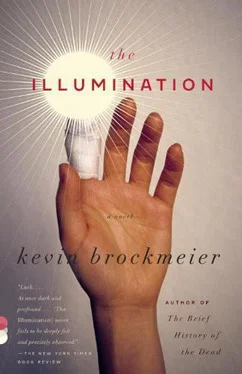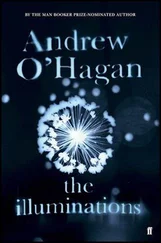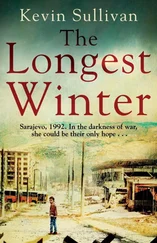Morse lost his grasp on them as they crossed the street. Ever since he was a child he had experienced these occasional episodes of deep understanding. Now and then, unpredictably, things would shiver as if from the cold, and he would know what someone nearby was thinking and feeling. It was happening more often all the time. One day, he was afraid, his life would be nothing but other people’s minds. Across the street, for instance, were a pair of glaziers unloading a sheet glass window from a truck flashing its hazards. The one supporting the lower end was named Ezra. A scrim of clouds breezed across the sky, filtering the sunlight, and there in the glass suddenly, as he tilted the pane, he saw his reflection, his dreadlocks spilling out of their elastic band like snakes from a can of novelty peanut brittle. Behind him the world was a claylike city color, the gray and brown of weathered sidewalks and high-rises stitched with fire escapes. It was so strange, so strange. He was backing up when the heel of his boot struck the curb. His reflection lurched away from him. He barely managed to steady the glass in time. Have a nice trip, Ezra. See you next fall. To his partner he said, “Take it a little slower there, why don’t you, yeah?” Every word was like a blade in his sore throat. The pain showed through his Adam’s apple, a dazzling string of broken beads. He hated himself when he got this way, hated his voice, hated his body. It was the city that did it to him. The crowds, the noise, the pollution. Two years, and he still wasn’t used to it. There were days when he could not close his eyes without seeing his Moms and Pops, his four younger sisters, his old bedroom, the luminescent stars on his ceiling, the above-ground pool in his backyard, the beautiful green and yellow of the trees sashaying in the breeze along the coast. He wished he could hear them rustling the way they did on those sunlit summer afternoons when he and his friends stood shaking them for nuts. I don’t like this place. I don’t want to be here.
And then he was gone.
Morse heard a train grinding metal, that unmistakable city sound, and from out of the subway came an enormous spreading tide of pedestrians. Bike messengers pedaled along the curb and swerved across the median, their wheels tilting back and forth. Cars followed one another into empty parking spaces like bowling balls tock ing into a ball corral. A bus stopped at the corner to discharge its passengers. In scarcely a second they broke apart, disappearing down side streets and alleys, into clothing stores, restaurants, and apartment buildings. To all of those who crossed in front of his blanket Morse repeated his sales pitch.
“One for two or cash money. One for two or cash money.”
Their skin was raw from the wind, their eyes glowing with fatigue or fever, allergies or conjunctivitis, and almost always they passed him by. Occasionally, though, one would stop and look at his merchandise.
“What does that mean, one for two?”
“One of my books, two of yours. Or cash money.”
“What if I don’t have any books with me?”
“Then cash money.”
“How about for the Basilakos? The hardcover there? What would that set me back?”
“Price inside the cover.”
It happened the same way every day, eight to ten hours of work for a few dollars in sales. No one ever came to him with books to trade, except for a handful of his regulars. The one with the clip-cloppy high heels and the endless collection of alternate history novels. The one who shopped for his bedridden grandmother, picking out the kind of mysteries that had the name of the author embossed across half the cover. The one who sorted through Morse’s entire stock every Monday and Thursday, deftly and selectively, as if culling the almonds from a jar of mixed nuts. And the smaller one, the talker, who had left Morse staggering across the hospital parking lot the day the Illumination began, his body whitewashed with lacerations.
“How goes it, MP?” That was what he called him, MP—short, he said, for Morse Putnam, Missing Person, Mister Popularity. “Keeping busy?”
“Yeah, yeah, keeping busy.”
“Selling a few books?”
“Selling a few.”
“And how are you feeling today? Feeling good?”
“Mm-hmm. Feeling good.”
This was their ritual, although sometimes it was “Are you feeling groovy today?” and Morse would say, “Feeling groovy,” or “Are you feeling lucky today?” and Morse would say, “Feeling lucky,” which made the one with the gold watch and the vein in his forehead chuckle and tell him, “You’re okay, my friend. Nothing wrong with the old Morse-man, is there? Anyway, two of yours for one of mine, right? That’s the bargain?”
“ One for two . One for two or cash money.”
“Yeah, I know, I know. I’m just twisting your balls a little. Here you go,” and he would hand Morse a pair of hardcovers he had just purchased from Barnes & Noble, the printing sheen still on the jackets. Sometimes, if the smaller one was in the middle of a job, he would leave immediately, but often he would stay and chat with Morse for a while, telling him about the college girl, a real looker, he had goated around with at his cousin’s wedding, or the flatbed truck that had woken him grinding its engine that morning, or the trouble he was having with one of the smackheads over on Spring Street. His first few visits to Morse had been guilt visits, pity visits, his way of showing faith to a living thing he had hurt and tried to help, like a man stopping off at the pound to look in on a stray dog he had clipped with his car. Let’s take a peek at the poor battered son of a bitch. Let’s see if we can’t donate a few bucks to the cause. Soon, though, somehow, he had developed a real affection for Morse. He began confiding in him, telling him dirty jokes, asking after his health. On torrid summer days, when Morse’s old wounds lit up, the smaller one would make a wincing noise of drawn breath and shake his head in apology. He seemed genuinely sorry to have injured him—and in spite of himself, Morse responded to his contrition.
“All right, then, take it easy, MP,” he would say after he had plucked some yellowing old best seller from Morse’s blanket. “Don’t let the bastards grind you down,” and once he had left, Morse would turn the books he had given him spine-side-up and riffle through the pages, watching the shower of fives and tens that fell ticker-taping to the ground.
In the winter you could never stay comfortable. It began with your hands, which grew chapped from the cold and turned a frayed, weather-bitten red. You could breathe on them, you could wedge them under your arms, but it made no difference. They would not stop aching. Your blood showed its pain in them with every pump, phosphorescing through your skin like those deep-water krill that glowed in the wake of a ship. Your eyes dried out, and your stomach gripped you. You experienced a piercing sensation in your eardrums. There was a specific dental pain, brought on by the way you clenched your teeth against the chill, that you could see throbbing through your gums in the morning, bouncing up at you when you cupped your palms to your mouth. As for your feet, you could not feel them at all. Sometimes, walking, you were amazed to see them stumping away beneath you. It was as if they belonged to another being who had fallen mysteriously under your command. You wore layer after layer of clothing, wrapping everything you owned around yourself—jackets on top of sweaters, jeans on top of flannels—and as the sun rose, your sweat wicked gradually into the fabric. Because you had nowhere to do your laundry, colonies of fungus formed around you. You did not notice the smell usually, but now and again, caught in the warm burst of air from a subway grate, an awful fetor would billow up around you. There was the outdoor life, and there was the indoor life, and you had far too much of the one and far too little of the other. The outdoors offered speed, commotion, and freedom of movement. The indoors offered comfort, security, and its own kind of freedom, freedom from the jabs, nicks, and toothmarks of the cold and the rain. Occasionally, when the smaller one had been unexpectedly generous with you, you would check into a cheap hotel for the night, taking advantage of the warmth, but such nights were rare, and from time to time, in your desperation, you were willing to settle for something less—if not the indoors, then at least the illusion of it.
Читать дальше












